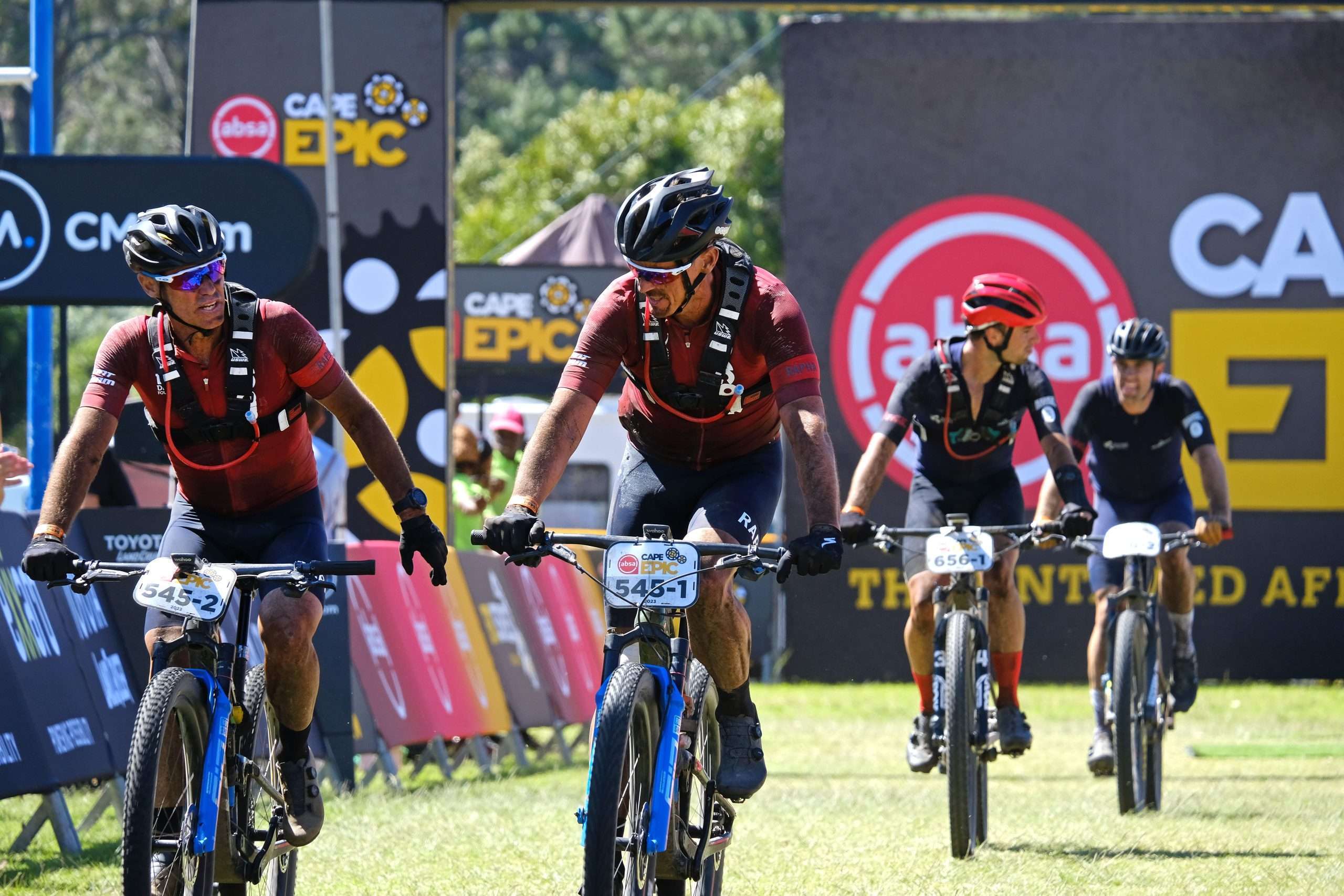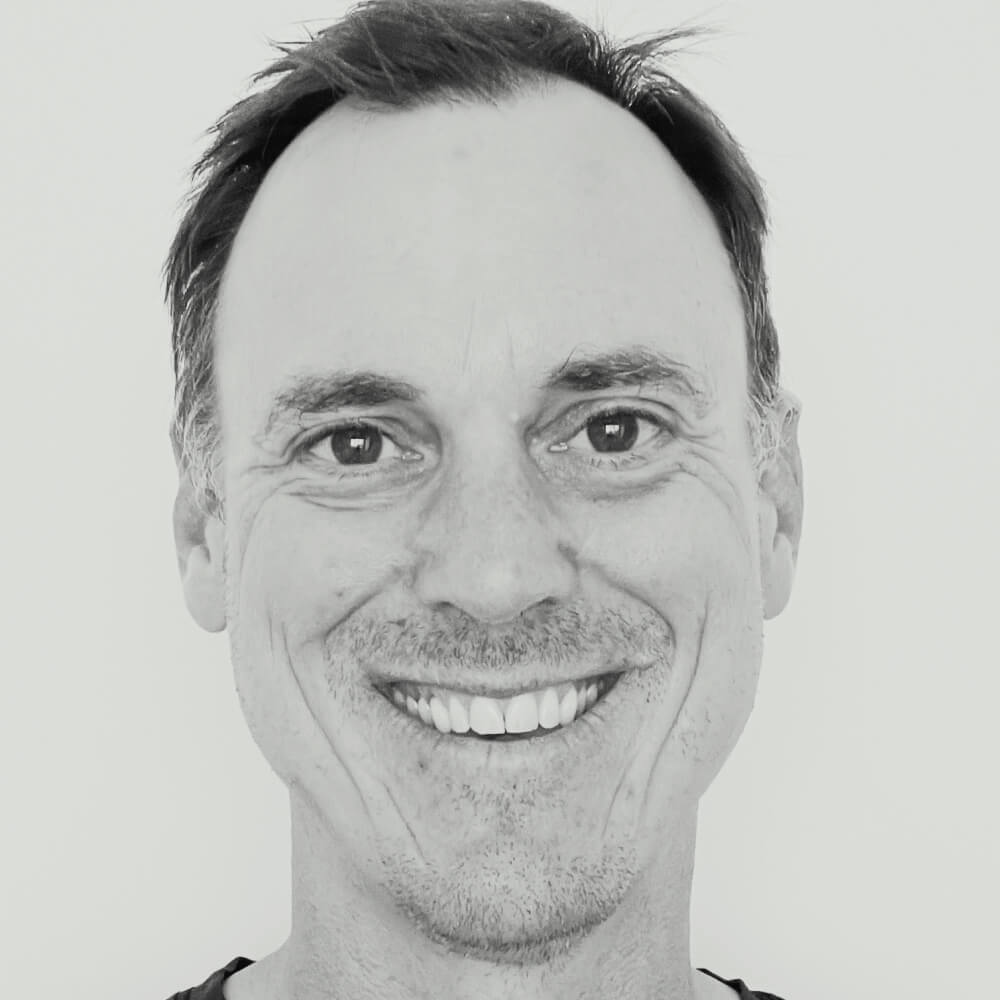There were many storylines from this year’s Cape Epic that I wanted to write about.
There was the unpredictable and thrilling race for yellow where Nino Schurter and Andri Frischknecht lost the GC on the final stage to Matt Beers and Christopher Blevins.
There were ex-pros Mitch Docker and Ian Boswell who were dominating the amateur category and getting flack about it. (In their defence, they were in ’no-man’s land’ in terms of suitable categories as they’re no longer racing competitively. What were they to do?)
There were other big-name former pros racing as well. Like Vincenzo Nibali and his partner who came in 13th overall in the pro category, as well as Lachlan Morton and Keegan Swenson just ahead in 11th. Former Tour of Flanders and Paris-Roubaix winner Niki Terpstra’s team finished 57th.
Perhaps the anonymous stories at the back of the race were the most profound. There was the Taiwanese female pair (Team CHLOWE) who slogged it out for close to 10 hours in the pouring rain and missed the cutoff time by mere minutes amongst a cheering crowd.
There was ex-pro David Millar and his sister Fran slogging it out at the back in the mixed pairs category, determined to finish.
Then there were the many participants who suffered gastrointestinal illness, literally shitting themselves on and off the bike for a week straight, but kept riding.
All these stories are worthy and fascinating, but the layman’s story that I’m in the best position to tell is that of Allan “Alby” Iacuone and myself, as we made our own third attempt at Cape Epic. The first time, our race ended due to illness; the second, the race was cancelled due to COVID, after we’d arrived in South Africa.
Would it be a case of third time lucky?
Travelogue
We arrived in Cape Town, South Africa three days before the prologue and couldn’t have felt more prepared or excited to be there. This race had been looming over us for three years since we got turned around in 2020. We did the necessary training, had the best equipment money could buy, and we were bursting out of our skin to get a good result in this elusive race.
We landed three days before the prologue to get over jetlag, pre-ride the course, and get the on-ground logistics sorted. It’s tempting to come sooner, but we’ve done so in the past and all we end up doing is resting the legs, eating too much, and a lot of “hurry up and wait.”
Prologue: Delusion
27 km | 750 vertical metres
During the prologue pre-ride we met our mates Mitch Docker and Ian Boswell (I’ll refer to them by their team name “Digger & Doughboy” from now on) and the trash talk began. These two are so down-to-Earth that it’s easy to forget they were both racing at the highest level for two decades between them.
Mitch knows how to talk shit better than he knows how to ride a bike and has a way of getting into our heads. Digger & Doughboy were starting three minutes behind us and Alby and I convinced ourselves that our goal in the prologue was to not get caught by these two. Pride was on the line and we wanted to show that us old farts still had it for a quick stage like this.
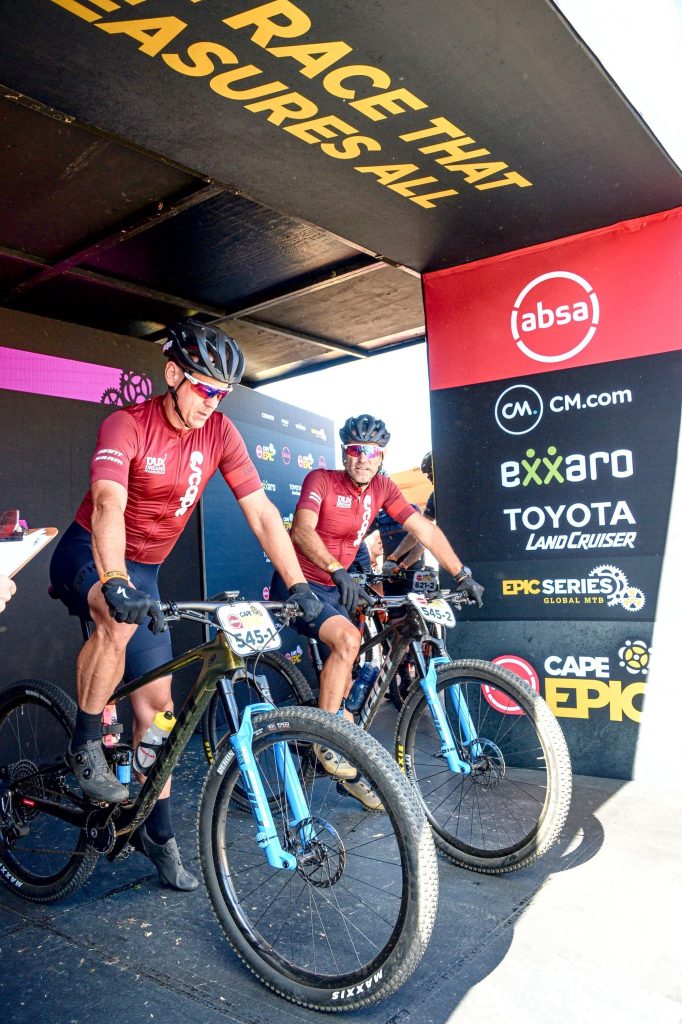
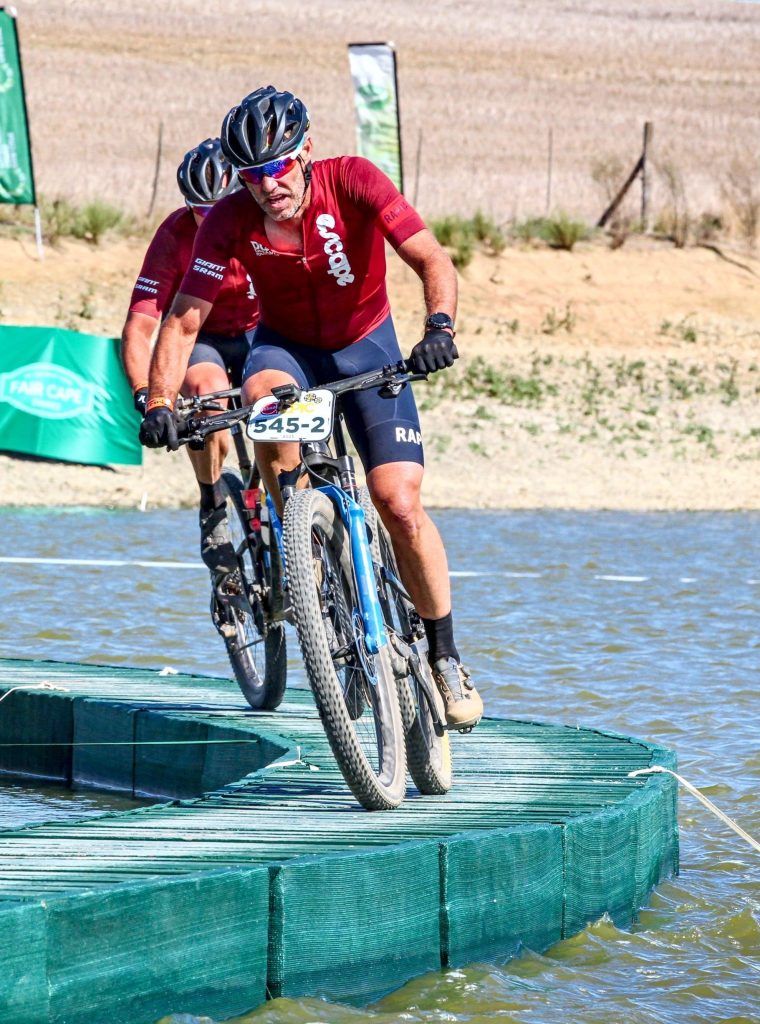
We rode hard out of the gates and it was only about a kilometre before the trail went straight up. We could already see Digger & Doughboy on our backsides so we hit the gas even harder for the 15-minute climb.
We got up and over and thought we had lost them. But as we headed into what looked like my hometown Manitoba prairies I looked back and saw Boz in TT position with a plume of dust in his wake. They came past us like a freight train and we quickly hopped on. Mitch was up to his old tricks and backed Alby off a few bike lengths. Alby fell for it, and Mitch sprinted back onto Boz like a rocket and they rode off into the harvest moon. It took all of 20 minutes for them to catch us. What were we thinking?
We had a good stage, chuckled at our arrogance, and rode a time that qualified us for ‘A Group’ in the starting pen the next day. That’s exactly what we wanted.
To finish the day we went back to our hotel with Digger & Doughboy, watched Mathieu van der Poel dominate Milan–San Remo, and traded war stories of our half-dozen battles up the Poggio between the four of us.
For comparison to see how good the good riders are, and how average we are:
- Digger and Doughboy time: 1:09:58
- Masters winner: 1:09:08 (Jan Fisnar & Pavel Gonda)
- Grand Masters winner: 1:14:05 (Bart Brentjens & Abraao Azevedo)
- Our time: 1:18:02
Stage 1: Wind from hell
98 km | 2,550 m
I woke up with Alby pointing out that we wouldn’t feel this fresh again for the next seven days. It was a good feeling. We’d only ridden a hard 80 minutes the previous day, burned off the freshness, and we were ready to hit to the big stages.
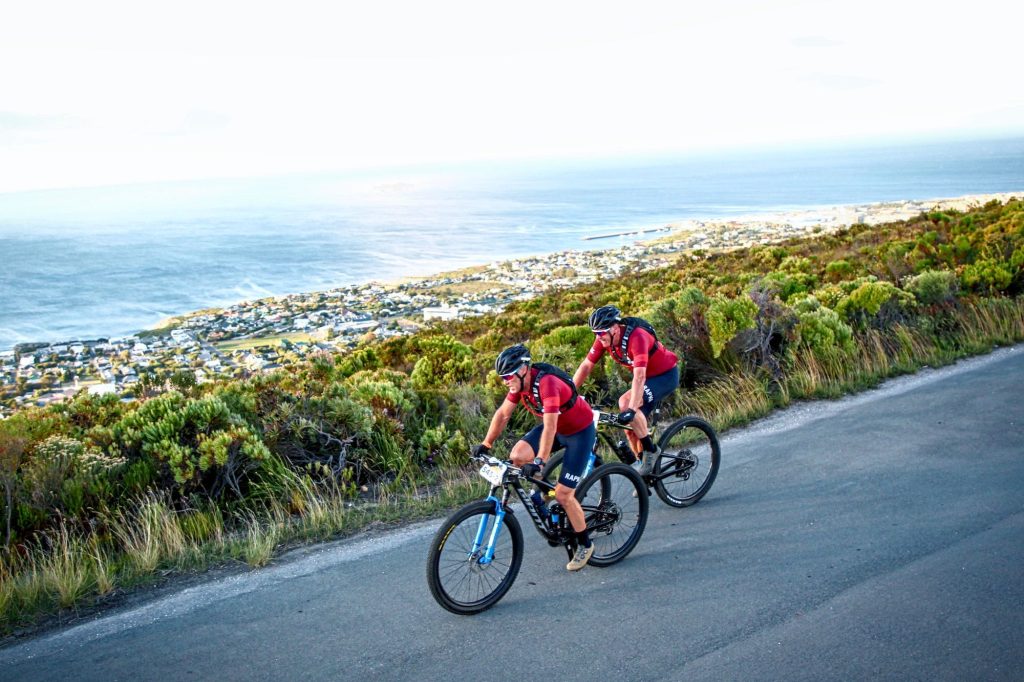
We were in the beautiful seaside town of Hermanus and were familiar with some of the terrain we’d be riding. Our goal wasn’t to stick with Digger & Doughboy, but to ride conservatively. If we thought we were going a bit too hard, we agreed to back it off. We had made this mistake back in 2019 where we rode stage 1 like it was a one-day race and we paid dearly for it later.
For those of you who don’t know my race partner Allan (Alby) Iacuone, he’s a former professional road racer and just a great guy all around. We’ve done many of these events together and I’ve gotten to know his strengths, weaknesses, and idiosyncrasies.
Stage 1 was typical for him. He often whinges on the first day of a big race like this, and then he comes good and blows the doors off me. He was feeling flat for most of stage 1 and I knew we just needed to go his pace while he found his legs. He never really did come good, which wasn’t normal, but I know how much training he’d been doing so I wasn’t concerned.
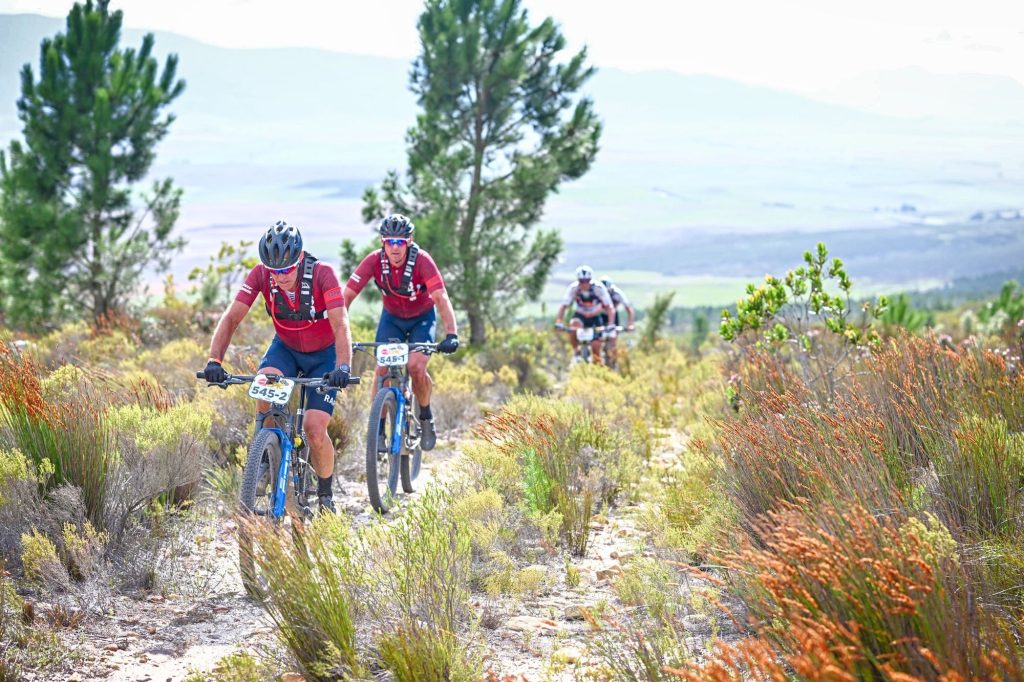
100 km is a long way on a mountain bike, especially when there’s lots of singletrack involved. Double that when you’re not feeling on top of your game.
Besides me being the hammer and not the nail for once, the standout memory of stage 1 was the howling wind. Reports were that gusts were over 90 km/hr and the roads coming back into Hermanus were both fast and treacherous. Alby was literally blown off his bike once (fortunately it was at low speed) but some of the crosswind crashes we heard about on the descents sounded horrific. Our Kiwi friends Mitchell and Nathan had a race-ending crash, and cobbled Classics legend, Niki Terpstra, also came down hard.
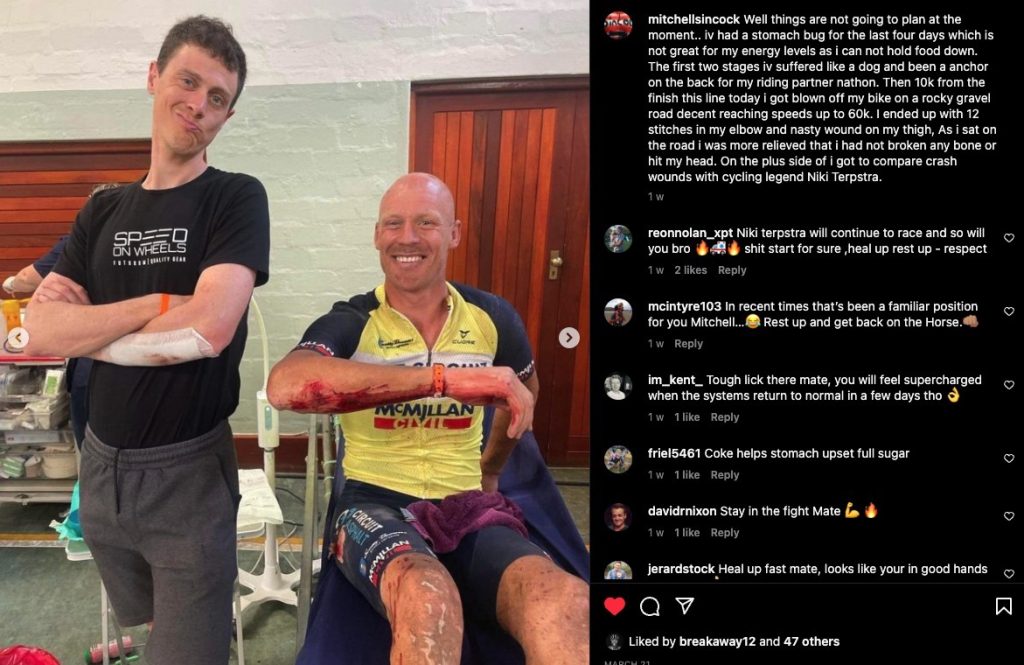
We made it through unscathed and by the end of the stage Alby was coming good again. Personally I felt good about our race so far and we were sitting in sixth spot in Grand Masters GC by the end.
- Digger and Doughboy time: 4:35:24
- Master’s winner: 4:32:48 (Craig Uria & Michael Posthumus)
- Grand Master’s winner: 4:55:32 (Bart Brentjens & Abraao Azevedo)
- Our time: 5:15:22.5
Stage 2: Prelude to disaster
116 km | 1,850m
Stage 2 was the longest but flattest stage of the race so as a bigger guy, I was quite excited about it. I woke up after a night of tossing and turning and going to the toilet many times, but didn’t feel horrific. In fact, I thought I’d just eaten too much, like I’ve done countless times before.
The race was fast and furious straight out of the gates and keeping in the shelter of the pack was something I knew all too well. It’s far easier turning yourself inside out for a few moments to keep with the pack, rather than getting dropped and fighting that wind all alone.
Alby is particularly good at sucking a wheel but I nearly did get dropped a few times. My legs weren’t firing and I was low on energy, but we still managed to suffer away with the front group until the first big singletrack climb.
Lucky for me there isn’t much passing room on these climbs so I was more than happy to go at the moderate pace being set by the teams in front. I thought to myself “If it keeps like this, I’ll be fine.”
We overtook teams when the opportunities were there, but by halfway into the stage I was going dark. I was often too lazy to shift gears or raise my dropper post, and was making sloppy mistakes. No amount of gels or Cokes at the feed zone brought me out of it and we weren’t even going that hard. Alby was riding well and I felt like I was holding him back.
The descent off the final climb was nothing out of the ordinary, except when I looked around all I could think was, “this is not a place you’d want to crash!” It was quite barren except for jagged rocks sticking firmly out of the ground like knives in-between the switchbacks.
Before I knew it my front tyre had washed on me in the middle of a tight corner and I had fallen on my right shoulder and knee. I thought nothing of it. I brushed myself off and caught up to Alby in a couple minutes. There was a feed zone in a few kilometres, so I figured I’d check into what that cool wet sensation was running down my leg when we got to the next stop.
We arrived at the feed zone and when I looked at my knee I knew this wasn’t something I could continue riding on without some medical attention. I went to the medic tent to see if I could get bandaged up, because I could see the white of my kneecap. Adrenaline was pumping so it didn’t hurt, but I also knew that’s not something that should be exposed to the dust, mud, and water we were riding through.
The medic quickly cleaned and dressed the wound and got me back on my bike. We had about 35 km remaining and it was mostly flat, so as long as my knee moved and it was covered I was sure we’d still finish in a good position.
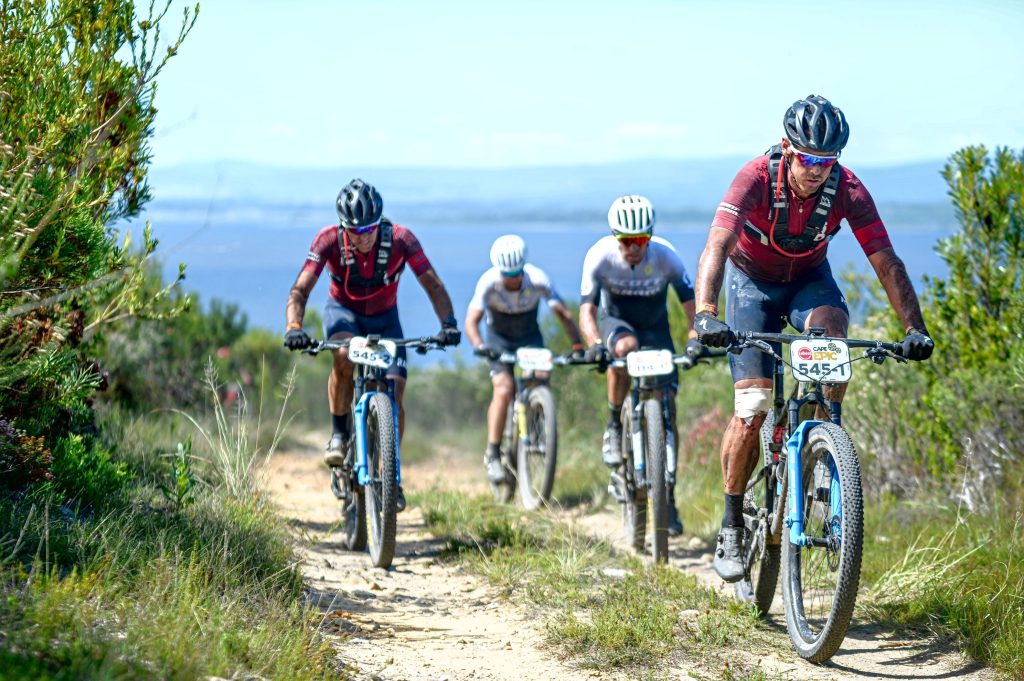
Whether it was the food I took in or the adrenaline pumping, I began to feel better. We caught our nemesis, Thomas Frischknecht (MTB legend) and his partner Urs Gerig (nicest and happiest guy you’ll meet), who we were battling for fourth spot. It was one of those “pinch me” moments where memories of some of Frischknecht’s greatest wins came back as we raced it out with them (I’m guessing Frischy didn’t even noticed us!)
We finished in fourth spot in our category and were happy with that. I went straight to the medical tent to get my knee stitched up. The doctors were concerned about my diarrhoea and some blood work they did and put me straight onto an IV drip.
That night we went to dinner with Digger & Doughboy and it wasn’t long before my guts were churning. Mitch WhatsApp’d me saying, “I think I got the Cape belly”. It’s well known that gastro sometimes sweeps through the race at Cape Epic but I didn’t give it much thought, even with my own unsettled stomach. Surely I just ate too much again …
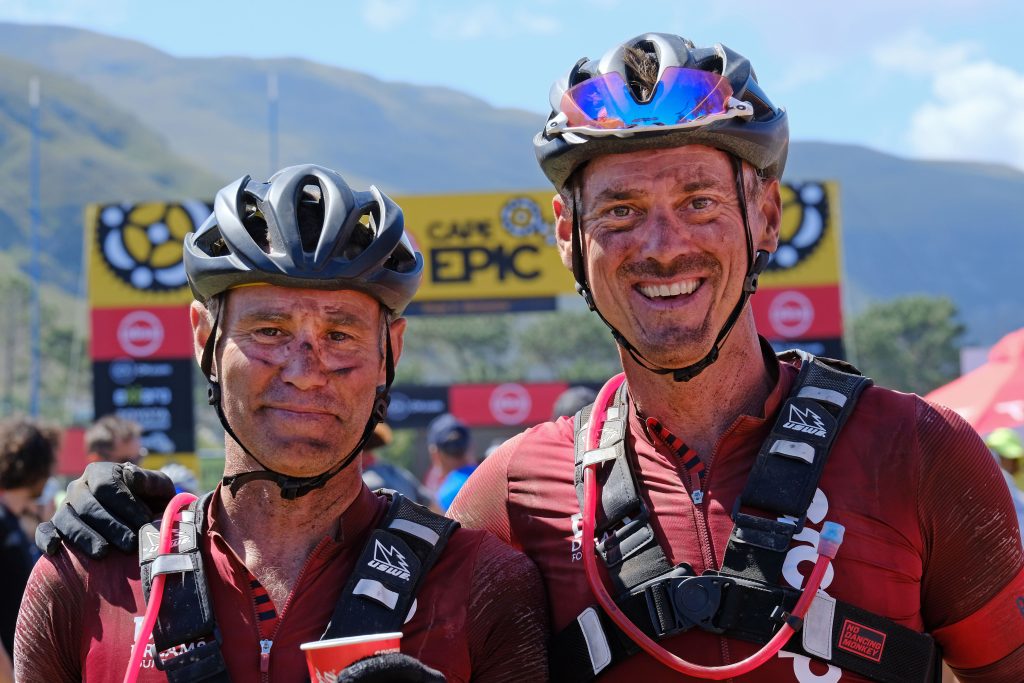
I thought I’d feel like a million bucks after the IV and medication they gave me, but I was in serious trouble that evening. Headache, nausea, diarrhoea. “Surely I’m just tired from the stage – it’s all part of it,” I thought to myself. “A good night’s sleep should fix things.”
- Digger & Doughboy time: 5:00:29
- Master’s winner: 4:51:17 (Karl Platt & Tomás Misser Vilaseca)
- Grand Master’s winner: 5:03:30 (Bart Brentjens & Abraao Azevedo)
- Our time: 5:37:11
Stage 3: Sufferfest
100 km | 2,300m
I woke up feeling like I had been hit like a truck after a night on the toilet and a splitting headache. It was another big stage but it hadn’t even crossed my mind that I might be too stick to race.
My knee was swollen but felt OK after moving it around a bit. I could see that I’d probably need antibiotics with the way it looked, but that could wait until after the stage. But as I’d soon find out, that would be the least of my problems.
I have almost no recollection of the stage. I was in a state of fog and tunnel vision with my guts doing backflips while I stared at the wheels in front of me. The only thing I remember was shadowing Frischknecht and Urs making sure they didn’t gain time on us, but that only lasted half the stage. We lost three minutes to them on the day, and they took fourth spot from us.
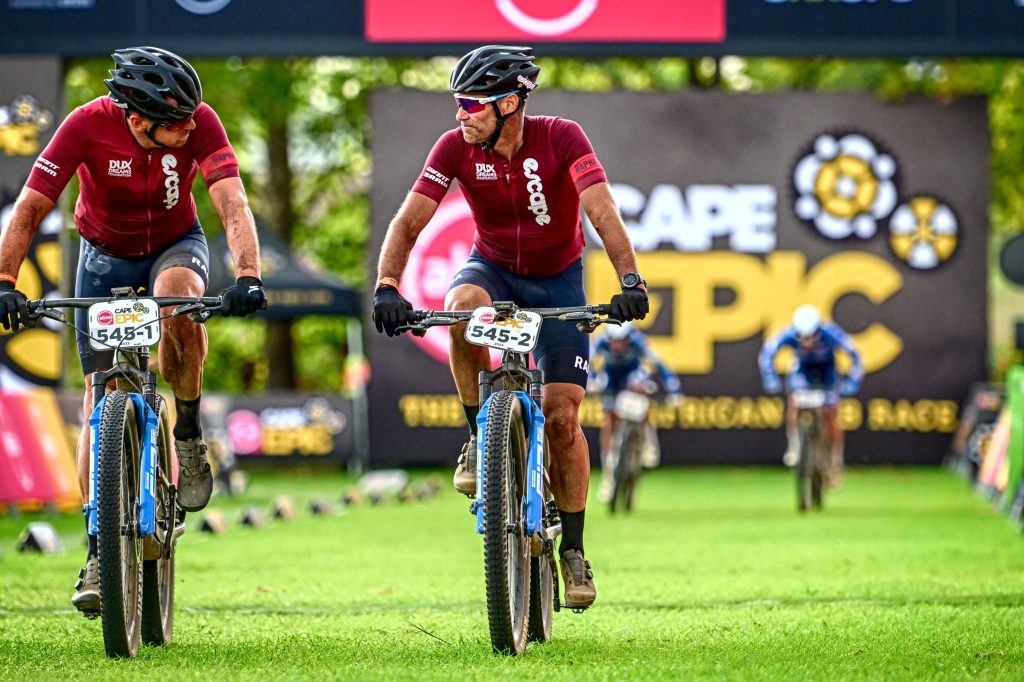
- Digger and Doughboy time: 4:43:21 (note that Aussie brothers Hayden and James Oliver beat Mitch and Boz on this stage by 15 seconds. Take it to ’em fellas!)
- Master’s winner: 4:28:51 (Karl Platt & Tomás Misser Vilaseca)
- Grand Master’s winner: 4:43:21 (Bart Brentjens & Abraao Azevedo)
- Our time: 5:19:04
Stage 4 TT: Not a rest day
47 km | 1,000 m
It’s funny how perspective changes when you approach a 2.5-hour stage as a rest day. I remember from 2019 how difficult this day was because as easy as you want to make it, you’re being chased, and you’re chasing. That makes it tough on everyone.
Frischknecht and Urs started a couple minutes before us and the goal was to make time on them. Thinking about it now, it may have been just as delusional as keeping away from Digger & Doughboy in the prologue.
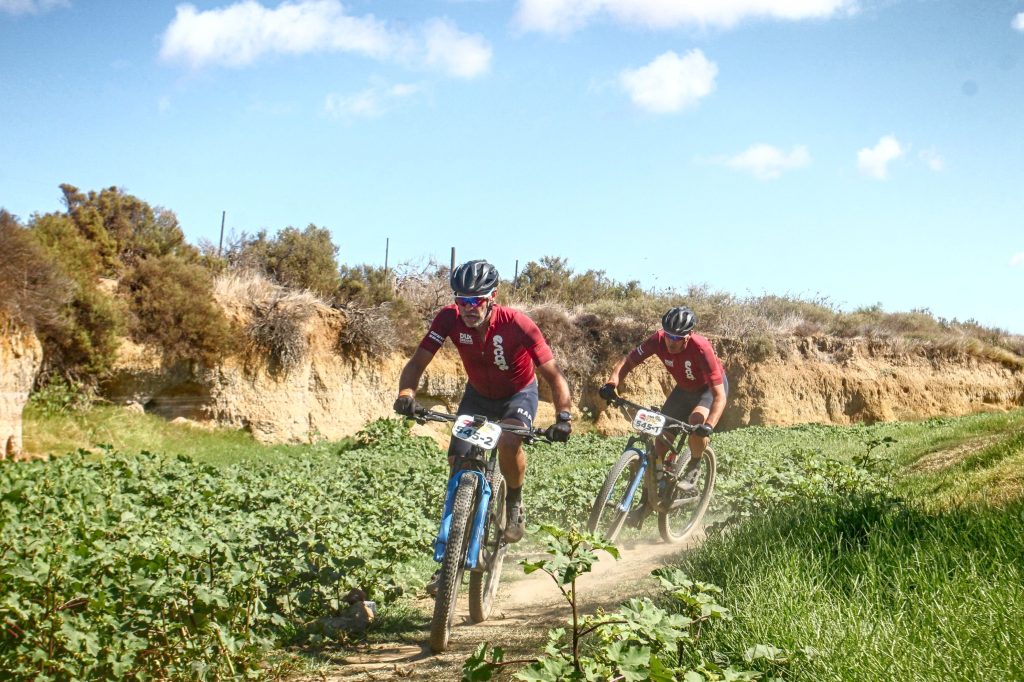
Alby was riding well but it only took me an hour before I went dark again. No amount of sugar and caffeine could bring me back and I suffered through the last half of this stage. I could tell by my power numbers that something was seriously off, yet it still didn’t occur to me yet that I was succumbing to illness. This is supposed to hurt, but it’s meant to be a much sweeter pain; a pain that I’ve trained for.
It wasn’t until the finish that Alby started talking about how horrible he felt through the stage. I thought he was just trying to make me feel better, but he was foreshadowing what was to come.
Instead of making time on Frischknecht and Urs, we lost three more minutes to them.
- Digger and Doughboy time: 2:02:30
- Master’s winner: 1:57:32 (Karl Platt & Tomás Misser Vilaseca VILASECA)
- Grand Master’s winner: 2:10:34 (Bart Brentjens & Abraao Azevedo)
- Our time: 2:26:36
Things got progressively worse that evening. I couldn’t keep any food or liquid down. I was in bed by 7pm unable to sleep, and Alby and I were in fierce competition for the toilet all night.
Stages 5, 6 & 7: Disappointment
We woke up at 4am on the morning of stage 5 and it had rained cats and dogs all night. Those poor people in tents. We both felt like we needed to go to the hospital and the thought of three more 5-6 hour days in the saddle was inconceivable.
With both of us being sick, we began to question why we were doing this and if we should carry on under these conditions. Maybe we could ride for one more day like this at a snails pace, but we’d surely put ourselves into a worse position tomorrow. And then what?
Alby is one of the toughest and most resilient guys I know, and when he agreed that there was no point carrying on like this I was conflicted with relief and disappointment. This decision would be final, and the likelihood of us coming back was slim. I’ve experienced the pain of quitting before and know that it’s far greater and longer-lasting than carrying on. But at that point, I didn’t feel like we had a choice.
We made our way to the next hotel with very few words spoken and a mutual understanding of the disappointment we were going through.
Illness had progressed even further with Alby and I wasn’t feeling any better, but wasn’t getting any worse. Our decision had been the right one, but the disappointment didn’t go away. The rain kept bucketing down which didn’t make me envy any of the riders out there, but at the same time I really wanted to be amongst it in those conditions.
Perhaps the toughest part of being sidelined was that we just sat there in our hotel rooms. We couldn’t go and salvage our trip by going on a safari or seeing more of South Africa. We just sat there in our hotel rooms in limbo. What an anticlimactic end.
Cape Epic typically finishes in an estate called Val de Vie which we’d been to before in 2019. In 2019 we experienced the pain of seeing everyone except for us finish and we vowed we’d be back. It took four years before we were at this same spot in Val de Vie again and this time was even more difficult. The sun was shining, the trails were mint, and the faces of elation crossing that finish line were infectious. It’s hard to not get caught up in it all and be happy for every last rider. This was an edition where finishing was that much more special because of the difficulty, and not being part of that shared experience was what I found toughest.
Epilogue
The ~20% attrition rate at this year’s Cape Epic was no higher or lower than most other years, but for us to be on the wrong side of that equation was heartbreaking.
Perhaps there are more lessons in failure than success, but as I write this I certainly don’t feel like defeat has added any sweetness to potential success one day. What does success even mean? Is it finishing the event? Is it placing on the podium? Is it winning your category? Or is it simply enjoying the process of getting to the start line?
When you ask yourself the question, “what would you sacrifice to finish?”, the calculus is very different at 49 years old than it was at 30 years old. After learning to deal with these disappointments, I’ve come to terms with the satisfaction of the process.
If I zoom out and look at the past six months, or even since 2020 when COVID took this event away from us, I couldn’t be more thankful for this race. This Cape Epic, like the others, frightened the hell out of me. It got me out of bed at 5am to ride six hours in the rain. It made me lose eight kilograms (18 lbs) which I thought was impossible now at my age. It brought back healthy habits. I even took up Pilates for God’s sake. Pilates!
It gave me something positive to think about while I was in a terrible work situation. It kept me focused and looking forward to something for the past three years while we waited out the pandemic. Making it to the finish line would have been the icing on the cake, but none of the stuff before then can be taken away from me.
Will we do it again? It’s probably too soon to answer that. For now, I think I’m good. What a race this enormous also does at this stage of my life is chip away at my family life. I sacrificed time alone with my wife on weekends. I missed some of my son’s basketball games. I rode in the pouring rain alone while I brushed off far more important priorities. I was able to do this because I vowed this would be my last. Maybe “last” is too final a word …
That’s not to say I wouldn’t recommend the Cape Epic to anyone and everyone who has a sense of adventure and wants to push themselves to the limit. That’s exactly what a race like this is about: testing your limits. Cape Epic certainly showed us ours, and we had the adventure of a lifetime doing it.
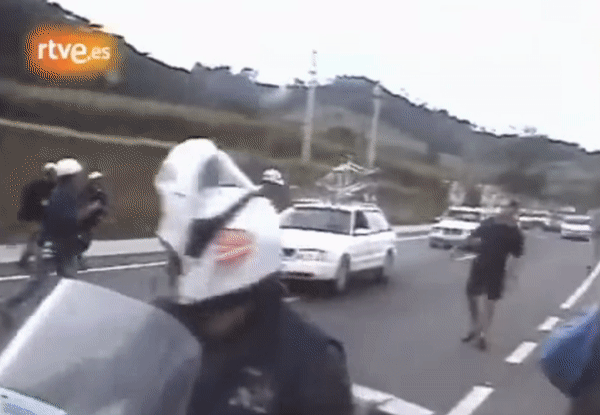
Thank you
There are many people I’d like to thank who helped make this Cape Epic adventure happen for us. First and foremost, the race organisation who provided media entries for us to participate. I can’t speak highly enough about how well run this event is and how wonderful the people behind it are.
I’d also like to thank SRAM for providing us with the new XX SL Eagle groupsets to try. They’re absolutely incredible. Thank you to Giant Australia for the pro deal on my bike, Specialized for the new Recon shoes, Rapha for supplying the Pro Team kit, Kevin Benkenstein for on-ground support, and the Dux Dream Foundation for helping out with costs and letting us experience this Cape Epic in more comfort. Last but not least, thank you to Mark Fenner of FTPTraining who timed my form to perfection once again.
Congratulations to every single team who made it to the startline and those who finished this epic edition. You’re the ones who make this race so special.
For a terrific insight into this year’s Cape Epic, listen to Mitch Docker and Ian Boswell’s podcast below:
What did you think of this story?

